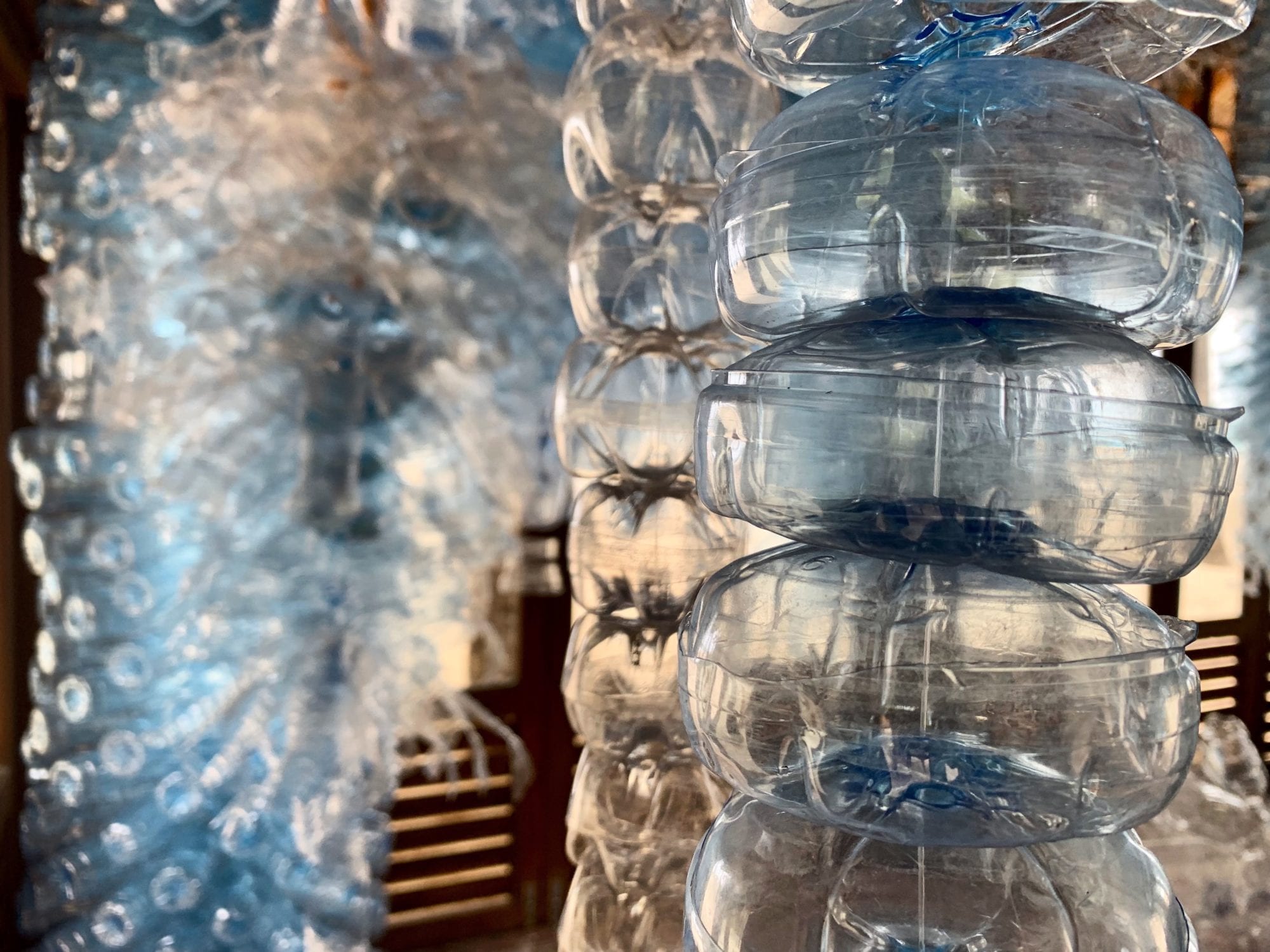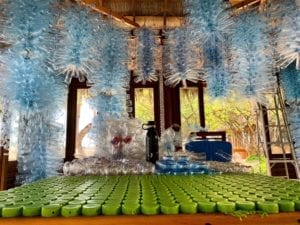
What is Plastic Pollution?
Bottles, bags, spoons, lids, straws, caps, blister packs, and more, I see a lot of plastic pollution. I also see a lot of plastic pollution in the hospitality industry; Airlines, hotels, restaurants, etc. Inspired to do something, I reached out to some marketing contacts in the industry and proposed a plastic pollution awareness project modeled on Curbing Entropy, an Eco-Art project I installed at the Cambodian Airport in 2017. I pitched the new project November 2018, and by February we began negotiations with the Conrad Maldives on Rangali Island. By May, I was on a plane to Male, the capital of Maldives. We chose to focus on single-use plastic bottles as they are the largest category in plastic pollution. To encourage community collaboration, we connected with local islands in the Maldives and begin intercepting the waste stream to collect single-use plastic bottles.
Why the Maldives?
The Maldives has no recycling program, nor do they really have a trash program, since about 2011, all trash is freighted by sea to India. Being situated in the Indian Ocean, they are exposed to ocean gyres that deposit and trap pollution in their beaches, atolls, and reefs. The Maldives is ground zero for climate change impacts on human rights as sea level rise will critically effect the country. Future forecasts of 1m sea level rise will greatly effect a country with a highest natural elevations of 5 meters. As an island country they are incredibly self-sufficient, with many islands effectively managing all infrastructure independently. The impacts of plastic pollution, consumer behavior, and choices of sustainability will greatly effect the future of the country.
What was the Art Proposal?
The Conrad accepted my proposal for a permanent site-specific eco-art sculpture, and as of this writing, I’m about halfway done, waiting to begin hanging it from the tallest ceiling in the Rangali bar, a focal point for the entire resort. Here’s the agreed upon blurb from both parties:
“Conrad Maldives Rangali Island has partnered with John Melvin to create an ephemeral site-specific art installation inspired by THE MURAKA, the world’s first undersea residence, for the resort and surrounding community. The goal for this piece is to become a catalyst for conversation, and creativity among guests and appreciators of art while incentivizing change to better care for our environment. The piece will feature single-use plastic water bottles to emphasize the removal of single-use plastics on property and the greater plastic pollution problem found in the Indian Ocean. For more information about the property or Conrad Hotels and Resorts please visit www.conradmaldives.com”
What is this Eco-Art Sculpture?
This Eco-Art sculpture has about 5000 up-cycled and reclaimed plastic bottles. This art project is modeled on a jellyfish. I’m twisting, cutting, splicing, and beading bottles, caps, bottoms and all sorts of things plastic bottle. Why plastic bottles? We focused on plastic bottles because the plastic pollution problem is really a human behavior problem. If each of us only used a reusable bottle for water, we would not need any single use plastic bottles. Sorted.
Here’s a shot from the studio demonstrating exactly that point. 
Here’s the video highlighting some relevant past works of mine. It is circulating in the hotel on the in-suite tv network and in my studio located in the middle of Atoll Market, the main restaurant at the Conrad.
We are coordinating a massive effort of media and support to have the sculptural installation complete by the 24th of June 2019. Follow along on my Instagram for up to date information. I am very thankful to Conrad and all the team for the support on this project, its been quite an adventure, and I’m honored to be making this artwork. The message means a lot to me, and I’m glad it means something to everyone reading this.
What can you do about Plastic Pollution?
You can help. The best thing you can do to eliminate plastic pollution is to stop buying plastic in the first place. Don’t buy single-use plastic. Its that simple. If you do, then be sure to reuse it as much as you can. And then, recycle that plastic. You’re not alone. The whole world is working on eliminating plastic pollution despite negative news to the contrary. The more each one of us steps up, the more there are of us. It’s simple. Connect with NGO’s in your community and volunteer. And tell your friends. Tell you family. Tell your boss. Tell everyone. In September 2017, Maldives became the 28th country to join the UN’s CLEAN SEAS CAMPAIGN, pledging to reduce single-use plastics and look to reduce and intercept plastic in the oceans, read more here. Parley for the Oceans is doing some great work partnering with the government and creating many campaigns. You can find out about conservation in the Maldives, here. Maldives as a country has many great natural gifts of beauty, and given the climate crisis we all are facing, Maldives is uniquely positioned to be a leader in positive proactive solutions.
Thank you.
JKM 2019


Interesting article. Well done for your positive actions. Love your new website!
Thank you !!!